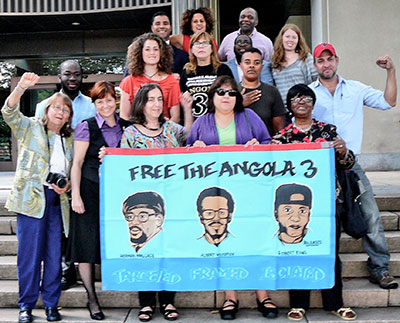Court hearing for Angola 3
Supporters rally for Albert Woodfox
Published Jun 8, 2012 8:56 PM
By Anne Pruden and Gloria Rubac
Baton Rouge, La.
Angola 3 supporters filled the federal courtroom in Baton Rouge, La., from May 29 through May 31 for Albert Woodfox’s evidentiary hearing on racial discrimination in the selection of the grand jury foreperson in West Feliciana Parish, where in 1993 Woodfox was reindicted for the 1972 murder of a prison guard.
|
Banner shows Herman Wallace, Albert Woodfox and Robert King;
targeted, framed, isolated.
PHOTO: BILLY X. JENNINGS/IT’S ABOUT TIME ARCHIVES
|
Woodfox sat at the defense table with his team of attorneys, his feet shackled and with one hand chained to his waist with two prison guards sitting just a few feet behind him, yet several times he managed to acknowledge the family, friends and supporters who had taken off from work and school to be in the courtroom.
The first day of the hearing, a bus of supporters and activists from New Orleans joined others from all around Louisiana, as well as from New York City; Houston; Oakland, Calif.; Atlanta; and Memphis, Tenn. International supporters were there from Britain, Scotland and Ireland.
Sitting in the courtroom each day were Robert King, the only freed member of the Angola 3; Woodfox’s brother, Michael Mable; Black Panther historian Billy X Jennings, publisher of “It’s about Time BPP”; activist and playwright Parnell Herbert, whose play, “The Angola 3,” was recently produced in New Orleans; Gordon Roddick from Reprieve in Britain; Southern University law professor Angela A. Allen-Bell; Everette Harvey Thompson, Amnesty International’s Southern regional director in Atlanta; and Mwalimu Johnson, with the Capital Post-Conviction Project in New Orleans.
Woodfox’s case began 40 years ago, deep in rural southern Louisiana, when he and two other young Black men, Herman Wallace and Robert King, were silenced for exposing racial segregation, systematic corruption and horrific abuse in the biggest prison in the U.S. at that time, an 18,000-acre, former slave plantation called Angola.
Protests such as hunger strikes and work stoppages were organized by prisoners, as were political education classes. A chapter of the Black Panther Party was formed. Prisoners called for investigations to uncover numerous unconstitutional and inhumane practices.
After a prison guard was killed in a 1972 rebellion, officials framed the three activists and threw them into solitary confinement. King was released from prison in 2001, but Woodfox and Wallace remain in solitary confinement to this day and are continuing to fight their convictions.
Solitary confinement and racism
The matter heard in court was the issue of racial discrimination in the selection of the grand jury foreperson in 1993, when Woodfox was reindicted for the guard’s murder, after having had his conviction tossed out in 1992.
The foreperson of the grand jury that indicted Woodfox for his 1998 retrial was white. Woodfox’s lawyers presented expert testimony on the consistent underrepresentation of African Americans as grand jury forepersons compared to their numbers in the general population and pool of eligible voters.
The hearings were presided over by Judge James A. Brady, the same judge who overturned Woodfox’s conviction the second time in 2008. Brady is expected to rule before the end of 2012.
April 17 was the 40th anniversary of the Angola 3 being held in solitary confinement — held every day for 40 years in a six-by-nine-foot cell! These cruel and debilitating conditions are internationally considered torture. A delegation of Angola 3 supporters joined Amnesty International at a press conference at the Louisiana state Capitol on April 17. They then submitted to Gov. Bobby Jindal’s office more than 67,000 petition signatures from people in 125 countries urging that Woodfox and Wallace be removed from solitary confinement. Jindal refused to meet with the delegation.
In a statement, Thompson argued that “the 40-year isolated incarceration of these two men is scandalous. There is no legitimate penal purpose for keeping these men in solitary. Louisiana authorities must end this inhumanity.”
Thirty-three people stood in a line on the Capitol steps, each holding a large letter to form the message: “40 YEARS OF SOLITARY” and “40 YEARS OF TORTURE!”
The story of the Angola 3 has been spotlighted by many media outlets. There are two new art exhibits focusing on the Angola 3: “The House That Herman Built” and “The Deeper They Bury Me, The Louder My Voice Becomes.” A play — “The Angola 3” — written by New Orleans native Parnell Herbert, has been produced in New Orleans and Houston.
Information on the case of the Angola 3 can be found on Facebook as well as at Angola3Action.org; Angola3.org and Angola3News.blogspot.com.
Articles copyright 1995-2012 Workers World.
Verbatim copying and distribution of this entire article is permitted in any medium without royalty provided this notice is preserved.
Workers World, 55 W. 17 St., NY, NY 10011
Email:
[email protected]
Subscribe
[email protected]
Support independent news
DONATE


